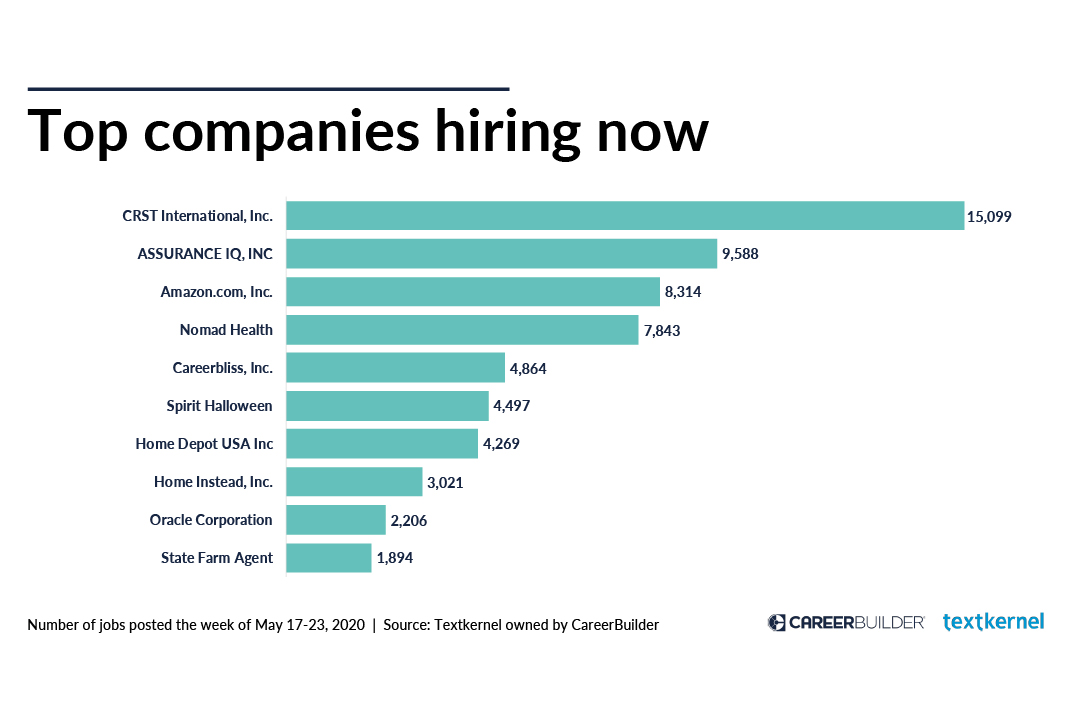Understanding the Job Market: Trends and Projections
The job market is constantly evolving, with new industries emerging and existing ones adapting to technological advancements and shifting consumer demands. To make informed decisions about their careers, job seekers must understand the current state of the job market, including trends and projections for high-growth industries. According to the Bureau of Labor Statistics, jobs that are high in demand, such as those in the healthcare and technology sectors, are expected to experience significant growth in the coming years.
One of the key trends driving the job market is the increasing demand for skilled workers in emerging industries. For example, the rise of renewable energy has created a need for professionals with expertise in solar and wind energy, while the growth of the digital economy has driven demand for workers with skills in data science and artificial intelligence. Understanding these trends can help job seekers identify areas with high growth potential and make informed decisions about their career paths.
Another important factor to consider is the impact of technological advancements on the job market. Automation and artificial intelligence are transforming many industries, creating new job opportunities in areas such as robotics and machine learning. However, they are also displacing certain jobs, making it essential for workers to develop skills that are complementary to technology.
By understanding the trends and projections shaping the job market, job seekers can gain a competitive edge in their career search. This knowledge can help them identify high-growth industries, develop in-demand skills, and make informed decisions about their career paths. Whether you’re just starting out or looking to transition to a new field, understanding the job market is essential for success in today’s fast-paced and rapidly changing work environment.
Top Industries with High Demand Jobs
Several industries are experiencing high demand for skilled workers, driven by factors such as technological advancements, demographic changes, and shifting consumer demands. Some of the top industries with high demand jobs include:
Healthcare: With an aging population and an increased focus on healthcare, jobs in this industry are in high demand. Examples of in-demand jobs in healthcare include nurses, doctors, and healthcare administrators. These roles require strong technical skills, as well as soft skills such as communication and empathy.
Technology: The technology industry is rapidly evolving, with new innovations and advancements emerging constantly. Jobs in this industry, such as software developers, data scientists, and cybersecurity experts, are highly sought after. These roles require strong technical skills, as well as the ability to adapt to new technologies and innovations.
Renewable Energy: As concern about climate change and sustainability grows, the renewable energy industry is experiencing rapid growth. Jobs in this industry, such as solar and wind energy technicians, are in high demand. These roles require strong technical skills, as well as the ability to work with new and emerging technologies.
Other industries with high demand jobs include finance, logistics, and education. These industries are experiencing growth due to factors such as globalization, urbanization, and demographic changes. Jobs in these industries, such as financial analysts, logistics managers, and teachers, require strong technical skills, as well as soft skills such as communication and problem-solving.
When considering a career in one of these industries, it’s essential to research the specific skills and qualifications required for in-demand jobs. This can help job seekers make informed decisions about their career paths and ensure they have the necessary skills to succeed in their chosen field.
How to Identify In-Demand Jobs in Your Area
Identifying in-demand jobs in your local area can be a crucial step in finding a career with a bright future. Here are some tips and strategies to help you get started:
Use online job boards: Websites such as LinkedIn, Indeed, and Glassdoor can provide valuable insights into the job market in your area. Use keywords such as “jobs that are high in demand” or “in-demand careers” to find relevant job listings.
Network with professionals: Attend industry events, join professional organizations, and connect with people on LinkedIn to learn more about in-demand jobs in your area. Ask questions about the skills and qualifications required for these roles and what the job market is like in your area.
Research local industry trends: Look for reports and studies on the local economy and job market. This can help you identify industries that are growing and in-demand jobs within those industries.
Check with local employment agencies: Employment agencies such as staffing firms and recruitment agencies often have knowledge of in-demand jobs in the area. They can provide valuable insights and help you find job openings that match your skills and qualifications.
Use labor market information: Websites such as the Bureau of Labor Statistics and O*NET can provide information on labor market trends and in-demand jobs in your area. This can help you make informed decisions about your career path and identify areas with high growth potential.
By using these strategies, you can gain a better understanding of the job market in your area and identify in-demand jobs that match your skills and qualifications. Remember to stay flexible and be open to new opportunities and industries – this can help you stay ahead in a rapidly changing job market.
The Skills and Qualifications Required for In-Demand Jobs
To succeed in jobs that are high in demand, job seekers need to possess a combination of technical skills, soft skills, and education requirements. Here are some of the key skills and qualifications required for in-demand jobs:
Technical skills: In-demand jobs often require specialized technical skills, such as programming languages, data analysis, and digital marketing. Job seekers can acquire these skills through online courses, certification programs, and vocational training.
Soft skills: In addition to technical skills, in-demand jobs also require soft skills, such as communication, teamwork, and problem-solving. Job seekers can develop these skills through internships, volunteer work, and extracurricular activities.
Education requirements: Many in-demand jobs require a degree or certification in a specific field. Job seekers can pursue higher education or vocational training to acquire the necessary education requirements for their desired career.
Continuous learning: The job market is constantly evolving, and job seekers need to stay up-to-date with the latest trends and technologies. Continuous learning is essential for success in in-demand jobs, and job seekers can pursue online courses, workshops, and conferences to stay current.
Adaptability: In-demand jobs often require adaptability and flexibility, as job seekers need to be able to adjust to new technologies, processes, and workflows. Job seekers can develop adaptability through internships, volunteer work, and extracurricular activities.
By acquiring the necessary skills and qualifications, job seekers can increase their chances of success in jobs that are high in demand. Remember to stay focused on your career goals and continuously develop your skills and qualifications to stay ahead in the job market.
Emerging Jobs and Industries to Watch
The job market is constantly evolving, and new industries and jobs are emerging all the time. Some of the most promising emerging jobs and industries include:
Data Science: With the increasing amount of data being generated every day, companies are looking for professionals who can collect, analyze, and interpret this data to make informed decisions. Data scientists are in high demand, and this field is expected to continue growing in the coming years.
Artificial Intelligence: Artificial intelligence is transforming many industries, from healthcare to finance, and companies are looking for professionals who can develop and implement AI solutions. This field is expected to experience high growth in the coming years, and job seekers who have skills in AI can expect to be in high demand.
Cybersecurity: As technology advances, cybersecurity threats are becoming more common, and companies are looking for professionals who can protect their networks and systems from these threats. Cybersecurity is a high-growth field, and job seekers who have skills in this area can expect to be in high demand.
Other emerging jobs and industries include renewable energy, healthcare technology, and digital marketing. These fields are expected to experience high growth in the coming years, and job seekers who have skills in these areas can expect to be in high demand.
To prepare for these emerging fields, job seekers can pursue education and training programs in these areas. They can also gain experience by interning or volunteering with companies in these industries. By staying ahead of the curve and developing skills in emerging fields, job seekers can increase their chances of success in jobs that are high in demand.
How to Stay Ahead in a Rapidly Changing Job Market
The job market is constantly evolving, and job seekers need to stay ahead of the curve to remain competitive. Here are some tips for staying ahead in a rapidly changing job market:
Continuous learning: The job market is constantly changing, and new skills and technologies are emerging all the time. Job seekers need to commit to continuous learning to stay ahead of the curve. This can include taking online courses, attending workshops and conferences, and reading industry publications.
Professional development: Job seekers need to focus on professional development to stay ahead in the job market. This can include seeking out mentorship, joining professional organizations, and volunteering for leadership roles.
Adaptability: The job market is constantly changing, and job seekers need to be adaptable to stay ahead. This can include being open to new opportunities, being willing to learn new skills, and being able to pivot when necessary.
Networking: Networking is key to staying ahead in the job market. Job seekers need to build relationships with people in their industry, attend networking events, and engage with others on social media.
Staying up-to-date with industry trends: Job seekers need to stay up-to-date with the latest industry trends to stay ahead in the job market. This can include reading industry publications, attending conferences, and following industry leaders on social media.
By following these tips, job seekers can stay ahead in a rapidly changing job market and increase their chances of success in jobs that are high in demand.
Success Stories: People Who Have Found High-Demand Jobs
Many people have successfully found high-demand jobs in various industries. Here are a few success stories:
Sarah, a data scientist, found a high-demand job at a top tech company after completing a master’s degree in data science. She credits her success to her ability to learn new skills quickly and her experience working on projects that involved data analysis and machine learning.
John, a cybersecurity expert, found a high-demand job at a government agency after completing a certification program in cybersecurity. He credits his success to his ability to stay up-to-date with the latest threats and technologies and his experience working on projects that involved network security and penetration testing.
Emily, a renewable energy engineer, found a high-demand job at a top energy company after completing a bachelor’s degree in engineering. She credits her success to her ability to design and develop sustainable energy systems and her experience working on projects that involved solar and wind energy.
These success stories demonstrate that finding high-demand jobs is possible with the right skills, education, and experience. By learning from these examples, job seekers can gain valuable insights into what it takes to succeed in high-demand careers.
Moreover, these success stories can inspire and motivate job seekers to pursue high-demand careers. By reading about the experiences of others who have found success in high-demand jobs, job seekers can gain a better understanding of what it takes to succeed in these careers and can develop the skills and knowledge needed to pursue their own high-demand career.
Conclusion: Taking the First Step towards a High-Demand Career
In conclusion, finding a job with a bright future requires a combination of understanding the job market, identifying in-demand jobs, and acquiring the necessary skills and qualifications. By following the tips and strategies outlined in this article, job seekers can increase their chances of success in high-demand careers.
Remember, the job market is constantly evolving, and it’s essential to stay ahead of the curve by continuously learning and developing new skills. By taking the first step towards a high-demand career, job seekers can set themselves up for success and create a bright future for themselves.
Final tips and recommendations for getting started on the path to a successful and in-demand career include:
Researching high-demand jobs and industries
Acquiring the necessary skills and qualifications through training and education programs
Networking with professionals in high-demand fields
Staying up-to-date with the latest industry trends and developments
Being adaptable and open to new opportunities
By following these tips and staying focused on their career goals, job seekers can increase their chances of success in high-demand careers and create a bright future for themselves.








